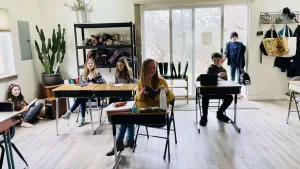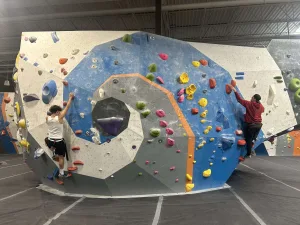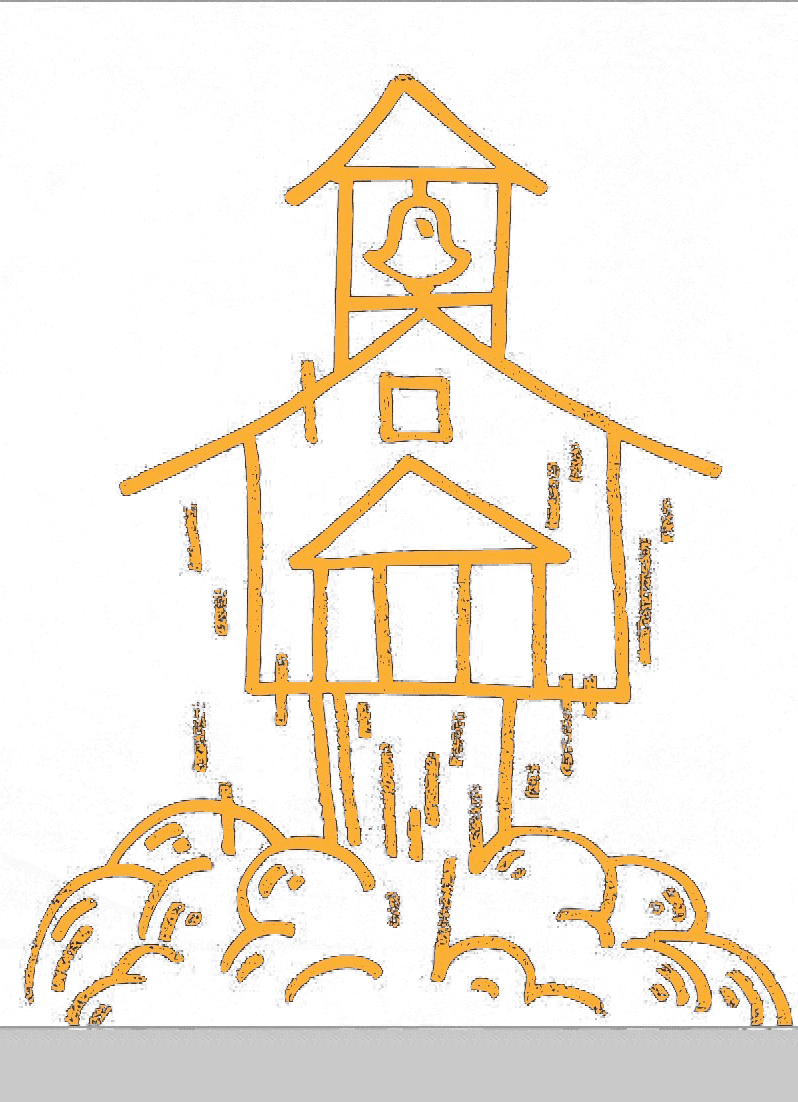Going into our ninth year as a homeschooling program, I had heard tales of other programs around the country plagued by zoning regulations that threatened their ability to serve families. For a long time, that happened “over there.” When a nature-based program in a nearby county experienced a raid-like encounter from their local zoning authorities, I was sympathetic and referred them to yes. every kid. foundation. for support. Still, that was a “them” situation and remained so… until it wasn’t.
On the afternoon of Friday, June 27, we met with our host church, which was undergoing a name change. As part of that process, they were required to file for a new use and occupancy permit with our local county. The week before their inspection took place, the church asked us whether we had our own use and occupancy permit. We were completely taken aback by this question because it had never been an issue with any of our other host churches, nor had it been an issue this past year.
In my years of homeschooling in various tutorial settings in multiple counties beginning in 2006, I had never heard of an entity utilizing an existing business’s space needing a separate use and occupancy permit. If we were a full-time business, such as a bookstore, a coffee shop, a barbershop, or even a tutoring center (think Mathnasium, Kumon Learning Centers, or Sylvan Learning Center) leasing an unoccupied commercial space, it would make sense that we’d have to obtain our own use and occupancy permit. But this was not the case. We were utilizing a church space to conduct classes, similar to what most churches do on a weekly basis with Bible studies, membership classes, etc. Because our program only met twice a week for a few hours, we fell under “ancillary use” of their church space. However, faced with this question, it appeared as though we were being reclassified into something we weren’t.
When we reached out to the county for answers, the information they offered was what would be provided to companies renovating an unoccupied space to lease. As much as we tried, the folks in the permitting office did not understand that we did not fall under that category. Yet as we looked further, there was no category of permitting that covered our situation. We are not a child care program, nor are we a school. Suddenly, we understood the difficulties that so many of today’s innovative educational models, such as microschools and learning pods, face when dealing with local zoning and permitting authorities. How do you define an entity that doesn’t fit any definition currently in place?
When the church underwent the county inspection, the inspector told them that they were not permitted to host us or any program like ours. But what did the county think we were? That remains unknown. The church is zoned for a residential area, and houses of worship are permitted because they function for “assembly” purposes. If our program were to pursue a zoning exemption, we would need to receive a separate use and occupancy permit and undergo county and neighborhood hearings. The church would need to be retrofitted with a sprinkler system and other cost-prohibitive upgrades, and after all that, we could still be denied. This was a no-win situation that none of us expected.
Thankfully, our program is resilient enough to pivot, and we’ve done just that. We’ll instruct online and have regular in-person gatherings in various locations for experiential learning opportunities. However, this experience has led to a much broader discussion as we move forward and look ahead to finding a more permanent location for the following program year. Several nagging questions remain: How are we being viewed by the county? Do they see us as a child care facility? Do they see us as a school? What we gathered is that they saw us as a commercial enterprise that doesn’t fall within the assembly parameters of the church, and certainly doesn’t comply with zoning requirements. But how is that possible given the limited time for gathering? On top of all of that, the county inspector relayed a story to the church of a similar program in the county that weeks ago was shut down before the end of their program year because they didn’t have their own use and occupancy permit. So, once again, how are we and programs similar to ours being viewed? How that question is answered impacts zoning, regulation, and licensing for us and programs like ours. It impacts how we are able to deliver quality instruction for our families. These are the same questions that countless other educational entities around the nation have answered for them by local government agencies—agencies which often understand very little about who they are and how they operate, hindering their ability to serve the families that need what they have to offer.
For solutions, I contacted our local Maryland State Delegate, shared our story, and offered one possible solution from the state of Utah. In 2024, Utah adopted Senate Bill 13 (SB13) (“Education Entity Amendments”), which lifted all zoning restrictions for any “home-based microschool or micro-education entity.” In recognizing that microschools are not the same as child care centers, nor are they the same as high-density schools, the legislation Utah enacted freed these multi-family learning environments to exist in residential as well as commercial areas. Additionally, an article by the State Policy Network reporting on Utah’s legislation correctly identified microschools as “small, multi-family learning environments,” a definition I would gladly place on our program in Maryland were it not for the fact that anything listed as a “school” or “academy” in our state opens itself up to a regulatory can of worms.
In Maryland, homeschool co-ops and tutorials are careful not to operate as schools. According to the Maryland State Department of Education, “If an organized group of students who are not in the same family is being instructed on a regular daily basis by someone other than their parent or guardian, then the educational program may constitute an unapproved nonpublic ‘school.’ As such, the operator(s) of the educational program would have to comply with the requirements of COMAR 13A.09.09…” Programs such as ours are not schools. They are, however, multi-family learning environments; they are micro-education entities that do not meet on a daily basis.
If legislation could be enacted in Maryland similar to what was enacted in Utah, programs such as eXtend would be free to operate within the walls of a church placed in a residential zone. We all would be free to operate practically everywhere. Neither programs like ours nor churches or other entities that host them would be forced to make costly structural changes required for programs that look nothing like ours. We would be free, as Utah founders are now, to create and run learning environments that meet the needs of our families. My colleague here at the Education Entrepreneurship Lab, Jennie Jones, is one of these Utah founders who launched her microschool for homeschoolers out of her home as a direct result of the legislative clarification.
As I approach a decade of running a homeschool program that this year will serve roughly 75 students in third grade through high school, I am now joining the battle for zoning and regulatory freedom that others throughout the country have been a part of. This is now my problem and my responsibility to enact change for the families my program serves and for others who are creating and benefiting from today’s innovative educational models.





